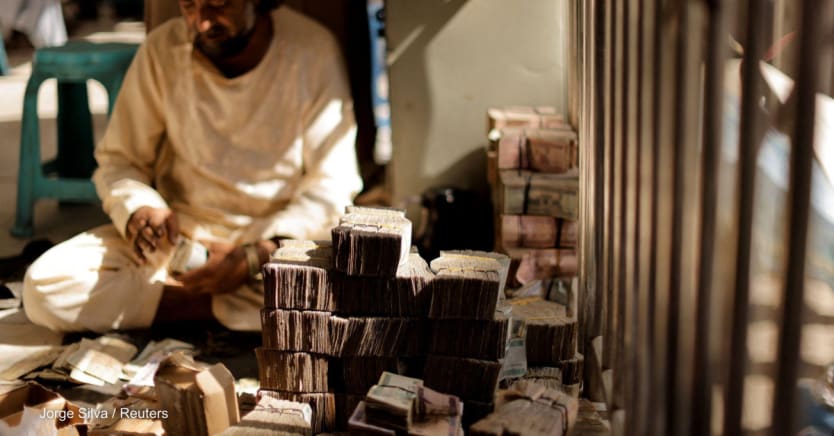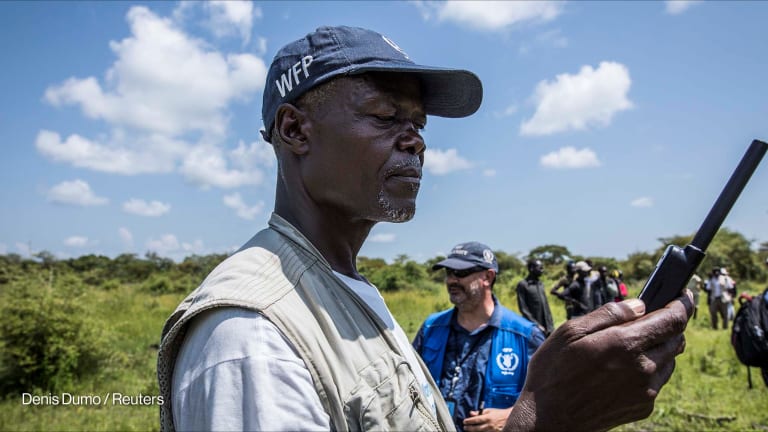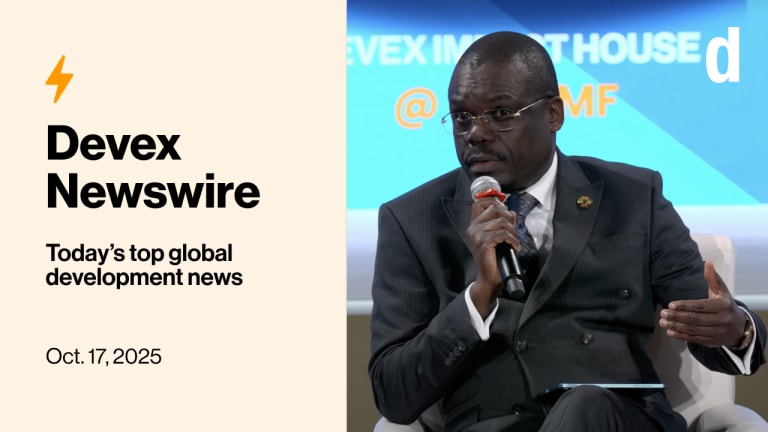
Afghanistan’s aid crisis has grown worse in recent months, with up to 98% of the population in need of support and the United Nations launching an unprecedented $5 billion appeal for the country.
But NGOs say that even if they get the funding, it will be hard to persuade banks to help transfer any cash into Afghanistan.
Sanctions from the United States and U.N. have been a major contributing factor to the crisis. Billions of dollars of Afghan assets have been frozen abroad. Partly as a result of the sanctions, the Afghan banking system has been plunged into chaos, and the country is facing a liquidity crunch.
“If we fail in Afghanistan, it reduces the humanitarian space around the world — in Yemen, in Ethiopia, in Iraq.”
— Jean-François Riffaud, CEO, Action Contre la FaimThe U.N. Security Council agreed on a humanitarian exemption to the sanctions regime in late December, helping aid groups once again operate legally in the country. Before the change, banks risked breaching their domestic laws or running afoul of the U.S. — which holds immense sway over the global financial system — by transferring humanitarian funds.
Last week, U.N. Secretary-General António Guterres said that further changes are needed to help the humanitarian effort.
“Rules and conditions that prevent money from being used to save lives and the economy must be suspended in this emergency situation.” he said. “International funding should be allowed to pay the salaries of public sector workers and to help Afghan institutions deliver health care, education, and other vital services.”
Keeping Afghanistan’s central bank in operation is critical, as is finding a path to release frozen Afghan assets, Guterres said.
‘A lot of risk aversion’
At present, a major problem is the lack of appetite among the foreign banking system to transfer funds into the country.
Guterres said the Security Council's adoption of a humanitarian exception to the sanctions regime “provides financial institutions and commercial actors with legal assurances to engage with humanitarian operators, without fear of breaching sanctions.”
But despite the greater level of reassurance, the banking system is still reluctant to engage in sending aid, said Kate Phillips-Barrasso, director of humanitarian policy at NGO alliance InterAction.
“There are few financial service providers allowing financial transactions into Afghanistan,” she said. “They just don’t want to get involved. There’s a lot of risk aversion. Financial institutions say that even with explicit permission, it still reeks of effort and risk, and it’s better to just not provide the service.”
As a result, funds are getting into the country through what Phillips-Barrasso called “full-scale workarounds,” such as physically transporting dollars via aid workers or relying on informal cash transfer networks, known locally as “hawala.”
“They’re charging exorbitant rates,” she said of hawala brokers. “They’re charging up to 10% per transfer. And there’s a lot of risk, and it leads to lengthy program delays.”
The U.S. government is evidently dissatisfied with the lack of engagement from financial institutions, according to Phillips-Barrasso. But the government cannot force them to provide services to NGOs.
“You can see it from the banks’ point of view,” she said. “It’s difficult to justify taking the time to do something that’s hard, doesn’t make any money, and has a reputational risk.”
For many of these same reasons, Action Contre la Faim — the French branch of Action Against Hunger — experienced practical difficulties getting funds and supplies into Afghanistan, said CEO Jean-François Riffaud.
“It’s just not in the interests of the banks to get involved,” he said.
What’s next?
Though using hawala has its drawbacks, work outside the formal banking system is seeing some short-term success among NGOS.
"Using agents who provide money, we are able to use that to distribute cash,” said Joram Chikwanya, acting deputy country director for programs in Afghanistan at CARE International.
In the longer term, if commercial banks remain unwilling to get involved, the U.N. and the humanitarian sector could potentially set up a public or nonprofit entity to transfer the money.
The ramifications of the international community’s actions could reach far beyond Afghanistan, Riffaud noted.
“This is a test of whether we can maintain a humanitarian space for NGOs to work and be protected from the sanctions regime,” he said. “If we fail in Afghanistan, it reduces the humanitarian space around the world — in Yemen, in Ethiopia, in Iraq. If we succeed in Afghanistan, it sends a positive message. If we fail, it sends a bad one.”
Shabtai Gold contributed to this article.








